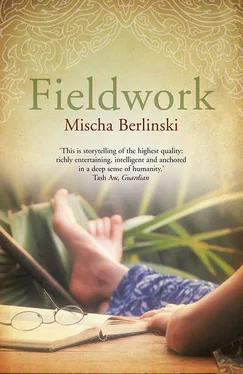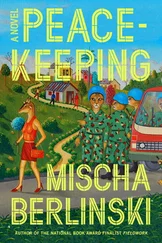Mischa Berlinski
Fieldwork
WHEN HE WAS A YEARout of Brown, my friend Josh O'Connor won a Thai beach vacation in a lottery in a bar. He spent two weeks on Ko Samui, decided that Thailand was home, and never left. That was at least ten years ago, and since then, Josh has done just about every sort of odd job a foreigner in Thailand can do: He taught English for a while, and was part owner of a nightclub in Phuket. He was a stringer for one of the wire agencies, and he took a few photos now and again for Agence France-Presse. Josh played the trumpet in the marching band in high school, and he parlayed the experience into a few years as the frontman for a Thai ska band called the King's Men. He founded a dating agency. He worked for a time for an environmental group attempting to stop construction of a large dam across the Mekong, and when the effort failed, he wrote publicity materials for a cement exporter. He hinted that many years ago, in a moment of real financial desperation, he smuggled a pound of hashish in his belly back to the States. I'm not sure that I entirely believe the story, but it was consistent with everything I know about Josh. Yet to see him, one would have no idea of his adventurous spirit: he was neither tall nor short but decidedly round; he was chubby-cheeked, curly-haired, and round-nosed, with bulging eyes and an oversized head. He had thick lips and a gap between his two front teeth which whistled very slightly when he spoke and made his speech nervous and breathy. His body was pear-shaped, with an enormous, protruding posterior: when he walked, he waddled like a duck; and when he laughed, as he did often, his whole body shook. "I'm attractive," Josh once told me, "to a lady who likes herself a big man." As it happened, there were a lot of little Thai ladies who did like themselves a big man, and Josh was never lonely. He was one of the happiest men I've ever met. It was Josh's conceit that he could order a meal better than any other farang in the kingdom.
I first met Josh when I was on vacation just out of college and back-packing through Malaysia and Indonesia, long before Rachel and I moved to Thailand. Josh and I were staying at the same hotel in Penang. He was on a visa run, down from Bangkok. Within about five minutes of spotting me in the hotel bar, Josh had sat himself down next to me and, in admirably direct fashion, informed me of his plans to start a pornographic production company in Vietnam. He had the funding, he said, contacts in the government, and an unbelievable star. These plans, like so many Josh O'Connor plans, eventually came to nothing, but his account was sufficiently compelling that whenever I'm in Bangkok, I always give him a call.
Now I was down from Chiang Mai, writing an article for a Singaporean arts magazine about an up-and-coming Thai sculptor, and Josh and I agreed to meet just after sundown in front of the Ratchawat market. I spent a long, sultry afternoon teasing a few good quotations out of my sculptor; then, just as the streetlights across Bangkok were flickering on, a motorcycle taxi deposited me in front of the 7-Eleven opposite the market, where Josh was already waiting for me, a goofy smile on his chubby face.
Plastic tables packed the narrow sidewalk. The sting of frying chili peppers made my eyes water, and from the market, now closing for the day, the sweet smells of jasmine, lilies, incense, and lemongrass mingled with the smells of rotting fish, molding durian, sweat, car exhaust, and garbage. On the corner, two competing noodle men served up bowls of guoy tieo in a ginger-and-coriander sauce; a little farther down the road, the curry lady had set up shop with huge vats of green curry and red, a jungle curry, a panang curry, and a spicy fish soup. A pretty girl cut up fresh mangoes and served them over sticky rice in a coconut sauce. There was somebody who grilled skewers of chicken over a small open flame and which he served with a peanut sauce.
But we were there for the fish family. All of the other vendors were ordinary, Josh said, nothing special, run-of-the-mill, the kind of stuff you'd find outside the market of any two-bit town from Isaan to the Malay border. But the fish lady and family, boy howdy , they were something else. "The prime minister's nephew told me about this place," Josh said, gesturing at the fish stall. Rows of silvery fish sprawled on a bed of ice, black-eyed, rainbow-gilled, and healthy-looking, as if they had just swum up minutes ago and were only resting; and below them massed ranks of clams, mussels, oysters, and ominous black anemones. "It's better than the Oriental Hotel."
We sat down, and Josh ordered for us. Twice our waiter walked away from the table, and twice Josh called him back to order still more food. Josh was at ease in his domain, leaning back in his chair like a pasha. It was August, the trailing end of the rainy season, when everything oozes. Josh pulled a piece of toilet paper from the roll on the table and gently blotted his face and hands, then opened his satchel and pulled out a half-empty bottle of Johnny Walker Black.
Josh was a natural raconteur, but he wasn't much for the old give-and-take of normal conversation: he asked after my day and listened to my reply with a distracted air, nodding occasionally, until he could be patient no longer. "That's just great," he interrupted. He took another slurp from his drink. "You know, I'm glad you're in town. I need someone who really knows the up-country."
This was Josh's subtle way of forming a segue from conversation to monologue: in all his years in Thailand, Josh had come to know the north far better than I did. There was hardly a corner of the kingdom that Josh didn't know, where he wouldn't be greeted by the abbot of the Buddhist temple — or by the madam of the best bordello — with a huge smile.
I waited to hear what Josh had to say. He paused for a second, as if gathering his strength. He leaned his heavy forearms on the plastic table. He pouted his heavy lips and flared his nostrils. He strained his round neck from side to side. Then he launched his story. There is no other way to describe it: a Josh O'Connor story is like a giant cruise ship leaving port, and when you make a dinner date with Josh O'Connor, you know in advance that you are going to set sail. It's part of the deal. It's a design feature, not a bug.
"Do you remember Wim DeKlerk?" Josh began.
He didn't wait for me to reply. In any case, I did remember Wim: he was a functionary at the Dutch embassy, and a drinking buddy of Josh's. The last time I was in Bangkok, I took Josh and Wim home from Royal City Avenue in a taxi, both of them singing Steely Dan songs at the top of their lungs. They were celebrating a stock tip that Josh had passed on to Wim from the prime minister's nephew. Apparently, Wim had made a killing.
"Well, about a year ago, I got a call from Wim. Some lady in Holland had called him , asking if he knew anybody who would go and visit her niece up at Chiang Mai Central Prison. This woman — the niece, not the lady in Holland, the niece is named Martiya, her aunt is Elena, both of them are van der Leun, are you following all this? — her uncle had just died, and the niece, Martiya, has inherited some money. Wim tells me the aunt wants somebody to go up there and take care of the details, you know, look this Martiya in the eye, explain what happened, make sure she understands everything. The aunt is about a zillion years old, doesn't want to travel, the niece won't reply to her letters, so she wants somebody to take care of this in person. Wim asks if I want to do it."
Читать дальше












